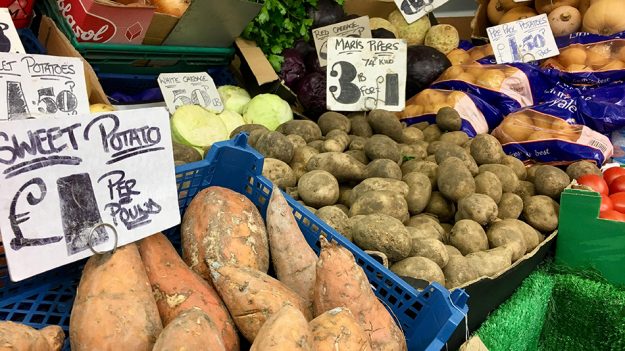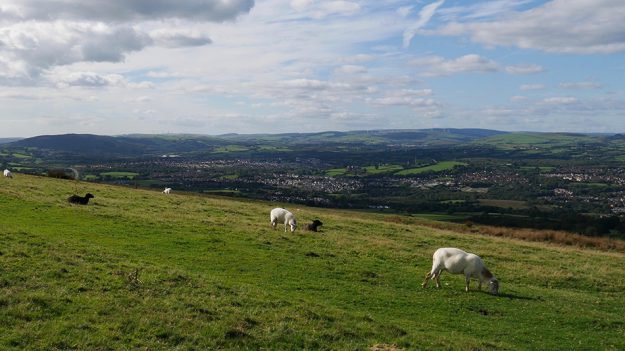Last month was the hottest February in Welsh history. So what does that have to do with poverty and homelessness in Cardiff?

In a country with millions of sheep, hundreds of thousands of dairy cows and 86,000 acres of organic farmland, the weather can mean a lot more than how to choose a jacket.
And while last month was the hottest February ever in Wales, uncertainty over Brexit looms and the country has seen a 30% rise in rough sleeping over the past year alone, creating what could be a perfect storm.
“It’s food. We’ve got to have it,” says Jamie Sullivan of Sullivan’s Green Grocer, located in the Cardiff Central Market. Sullivan’s is one of many local vendors who get some of their food from nearby farms.
The link between climate science, agriculture and poverty may not be intuitive, but Cardiff will be affected by all three. Difficulty in farming leads to problems throughout the food circulation process.
“You have those kind of peaks in temperatures and weather that are more and more regular—and of course that is detrimental to farming,” says Dr Ludivine Petetin, Lecturer in Law at Cardiff University, whose research focuses on climate change, sustainable farming and Brexit.
Temperatures reached over 20 degrees Celsius last month—the first time during winter in UK history. As crops bloom early and face the possibility of freezing over, Welsh farmers and their employees are right to worry.
Numerous studies have shown that unusual weather patterns are increasing because of climate change. Dr Petetin says these changes in weather lead to a shortage of feed for livestock and difficulty cultivating crops, and that they ultimately drive up the costs of farming.

Farmers are then forced to “cut corners” in an attempt to stay in business, she says, sometimes cutting farmworkers’ roles to temporary status.
“Of course, then, that would lead to a higher unemployment rate, more people coming to Cardiff to actually find a job,” she says, “which is often what happens when we look at the issue of homelessness in Cardiff.”
The BBC reported in 2017 that the number of farmworkers in Wales had hit a 20-year low, and housing and poverty charities have noticed trends like the one Dr Petetin referred to.
“Evidence would suggest that most people come to these areas for work opportunities,” says Rebecca Jackson, a Policy and Research Officer for homeless charity Shelter Cymru.
Among those facing poverty in rural Wales, many end up seeking services only available in Cardiff rather than staying closer to their homes.
“Some people who are already homeless will travel to the city to access services specifically for homeless people,” Ms Jackson says. “There is a lack of services in their own area.”
The agricultural industry isn’t only struggling with the climate: the duelling threats of extreme weather and uncertainty over Brexit are creating a perilous cycle of poverty throughout Wales.
“How do you prepare for something when you don’t know whether it’s going to happen?” Dr Petetin asks, referring to the chaos surrounding Brexit. She fears that if Welsh farmers who currently export lamb and produce to European countries have to limit themselves to a UK market, prices would rise for everyone in Wales.
“If the price goes up, that creates more food poverty,” she says.
Food bank usage has risen along with homelessness in Cardiff, and those already struggling would have an even harder time if food prices rise.

(function (d) { var js, id = “genially-embed-js”, ref = d.getElementsByTagName(“script”)[0]; if (d.getElementById(id)) { return; } js = d.createElement(“script”); js.id = id; js.async = true; js.src = “https://view.genial.ly/static/embed/embed.js”; ref.parentNode.insertBefore(js, ref); }(document));
“While there may be an impact on the number of people accessing Cardiff Foodbank if food prices rise, nobody knows for sure,” says Sara Redwood of Cardiff Foodbank.
Uncertainty is prevalent, as experts are left guessing about the impacts of climate change and Brexit and individuals are unsure how changes will affect food banks.
“I give a lot of stuff away every week,” Mr Sullivan of the grocer says, insisting that he still will even if food prices rise. “We’ll make it up another way.”
There’s no denying, though, the additional squeeze of donating more expensive items to those who can’t afford them.
Between difficult climate conditions, struggling farmworkers and a threat to usual exports, Wales’ massive agricultural industry already plays a huge role in poverty.
“They just don’t have enough,” Dr Petetin says. And the cycle continues.
